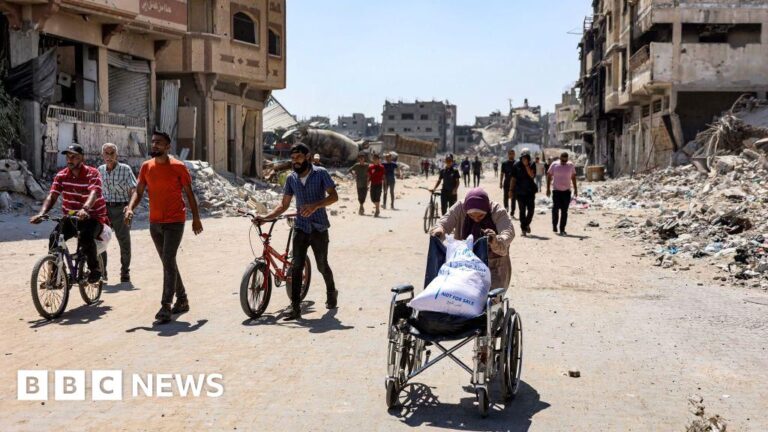- author, Sebastian Usher
- role, BBC News
- Reported by Jerusalem
-
Palestinians in Gaza City say they have experienced the heaviest Israeli shelling since Israel launched its war against Hamas following an unprecedented attack by Hamas on October 7.
Israeli tanks are reportedly approaching the city center from several directions.
Gaza Civil Emergency Services said it believed many people were killed but had so far been unable to reach them as fighting was taking place in several neighborhoods east and west of Gaza City.
Al Ahli Baptist Hospital was reportedly evacuated and patients were transferred to an already overcrowded hospital in Indonesia, one of the few medical facilities still functioning in the area.
Meanwhile, a senior Palestinian official told the BBC that indirect talks between Hamas and Israel on a ceasefire and the release of hostages are due to resume in Qatar within 48 hours.
The official said a preliminary meeting of U.S., Israeli and Egyptian intelligence chiefs was due to be held in Egypt on Monday.
Ahead of the attack on Gaza City, the Israel Defense Forces (IDF) ordered the evacuation of several central areas, including Tufa, Daraj and the Old City.
But Tel al-Hawa, one of the hardest-hit areas, was not included in the evacuation order posted online Sunday by an Arab spokesman for the IDF along with a map.
On Monday afternoon, the IDF issued new orders covering the areas of Tell al-Hawa and Sabra, as well as the north and west of the al-Rimal area.
“The enemy is behind us and the sea is in front of us. Where can we go?” asked Abdel Gani, a Gaza City resident.
Others also told the BBC they didn’t know where to go – the only way left for them to go was to head north, towards Gaza City’s port area, they said.
Some people fled the area after receiving evacuation orders, only to find that the areas they were heading to were being bombed by Israel.
In Al Rimal, a freelance cameraman working for the BBC said he had not been ordered to evacuate, but later learned his neighbours had.
He and his family left the area and headed north. They are now in the port area, but basic necessities are lacking. He says he is struggling to find water for his children.
The IDF confirmed in a statement that it had launched a new operation overnight in Tel al-Halwa, saying it had received intelligence about Hamas and Palestinian Islamic Jihad facilities and fighters in the area.
The army said it was also conducting operations at the headquarters of UNRWA, the U.N. aid agency for Palestine refugees, in the area.
The IDF said it would issue warnings to civilians at the start of the operation and set up humanitarian corridors for people to leave the area.
Israel’s latest attack on Gaza comes amid growing hopes that a ceasefire might finally be agreed.
A senior Palestinian official familiar with the negotiations told the BBC that indirect talks between Hamas and Israeli negotiators, mediated by Qatar and Egypt, are due to begin in Doha within the next 48 hours.
The official also said preparatory meetings were to be held in Cairo on Monday between CIA Director William Burns, David Barnea, head of the Israeli spy agency Mossad, and Egyptian intelligence chief Abbas Kamel.
All three intelligence chiefs are due to leave for Doha on Tuesday.
The official outlined some of the key issues from Hamas’s perspective to the BBC.
- Hamas wants Israeli forces to withdraw from the Rafah checkpoint on the border with Egypt and from the Philadelphia corridor along the Egyptian border.
- Israel has rejected Hamas’ demand to release 100 senior members of Palestinian Islamic Jihad and Fatah political factions from Israeli prisons.
Hamas’ negotiating team has already dropped its demand that Israel accept a permanent ceasefire as a precondition for any agreement.
The official said the negotiating process will be very long and complicated, but there is some hope that it might work this time.
Israeli Prime Minister Benjamin Netanyahu’s office may have dampened hopes somewhat with a statement on Sunday stressing that no agreement should prevent Israel from resuming fighting in Gaza until its war aims are achieved.
Prime Minister Netanyahu has repeatedly defined his goal as the military and political eradication of Hamas.

